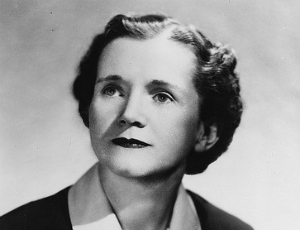In 1962, biologist Rachel Carson was dying of cancer as she launched a war against the deadly pesticides industry. Supported by her soul mate, a married woman named Dorothy Freeman, Carson poured the last energy of her life into Silent Spring, a book that shook the nation, caused the U.S. government to take immediate action and launched the modern environmental movement.
Silent Spring is available in multiple formats.
William Souder’s moving biography, On A Farther Shore, transported me into Carson’s private world and drew me into her romance with Dorothy, who was like the best friend you could possibly wish for. It transported me to the natural places Carson loved and studied, like Woods Hole, Massachusetts and the seashore of Maine. The book also immersed me in the rich cultural context that gave birth to Silent Spring, from 19th century nature writers like Thoreau to Cold War fears and fallout from nuclear testing. What I didn’t expect was that the book would make me nostalgic for the 20th century and the lives of my grandmothers, who shared both Carson’s passions for science and nature and the obstacles she faced in pursuing them.
On A Farther Shore is available in multiple formats.
If 496 pages is too much for you, check out The Gentle Subversive by historian Mark H. Lytle. This lucid and sympathetic recounting of Carson’s path is part of Oxford’s New Narratives in American History Series, which seeks to teach history through story. As someone who doesn’t read much history, I have to say that this approach worked for me, weaving American history deftly into a compact story of a fascinating and awe-inspiring woman.



Add a comment to: Rachel Carson, Woman for the Earth